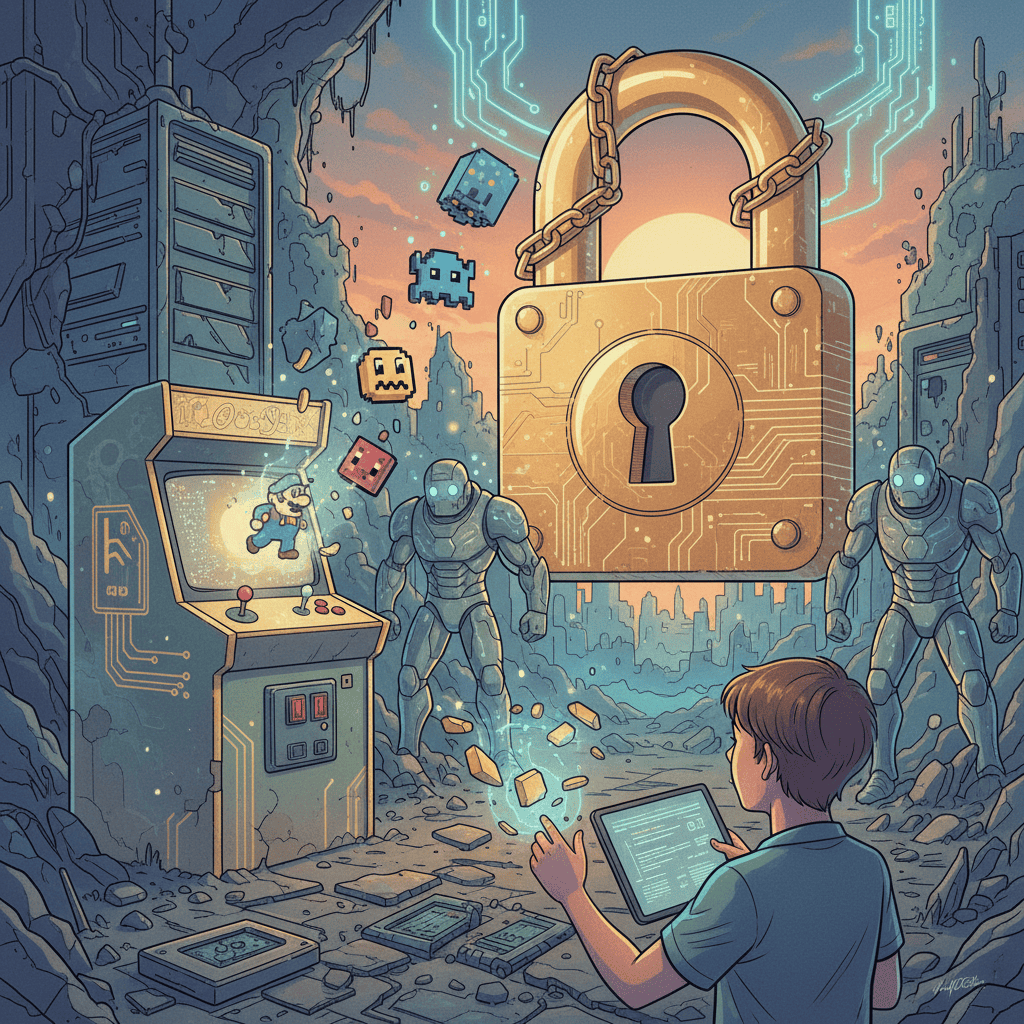So, you’re wrestling with ROMs and emulators, huh? The legality’s murky, the ethics even more so. Let’s tackle this head-on, from a seasoned arcade warrior’s perspective. I’ve spent decades shoving quarters into machines, collecting rare carts, and yes, even dabbled in emulation myself. Let’s cut through the noise and figure out how to navigate this digital minefield.
The Golden Age’s Ghosts: Nostalgia vs. Copyright
The first time I played Pac-Man in a smoky, buzzing arcade, it felt electric. That visceral experience, the smell of popcorn, the competition… nothing can truly replicate it. For retro veterans like me, emulation offers a powerful connection to those memories. We’re not just playing games; we’re reliving a piece of our past.

But then comes the elephant in the room: copyright. These aren’t free games; companies like Namco, Capcom, and Atari poured time, money, and talent into their creation. Emulation, especially when ROMs are downloaded illegally, directly undermines their intellectual property rights. This isn’t just about some faceless corporation; it’s about the artists, programmers, and designers who poured their hearts into those pixelated worlds.
Key Takeaway: Nostalgia is a powerful force, but it shouldn’t blind us to the legal and ethical implications of unauthorized emulation.
The Indie Arcade Revival: A Modern Perspective
The modern indie scene is bursting with games inspired by the golden age of arcades. Games like Cuphead, Blaster Master Zero, and Downwell capture that classic feel while adding their unique twists. For modern indie fans, emulation might seem like a cheaper, easier way to sample a retro style. But should it come at the expense of supporting these modern creators?
What many people don’t realize is that many of these indie developers are actively building on the history of arcade games, not just imitating it. They’re taking those original game mechanics and iterating on them using modern tools and tech. When you choose to emulate a classic instead of playing these new games, you’re potentially depriving these talented developers of the recognition and financial support that sustains the very genre you love.
The Legal Labyrinth: A Minefield of Grey Areas
The legal landscape of emulation is complex. Simply owning an emulator isn’t illegal. The grey area comes in when you use it to play ROMs of games you don’t own. Distributing those ROMs is a clear violation of copyright law, carrying potential fines and legal repercussions. This differs dramatically from legally purchasing ROMs, which, in some cases, is entirely acceptable.
The problem is inconsistent enforcement. Some companies vigorously pursue legal action against ROM sites, while others seem to tolerate it. This inconsistency makes it difficult to navigate ethically and legally. It’s a constant shifting legal landscape. There’s no simple “yes” or “no” answer.
MAME and Other Emulators: Exploring the Spectrum
MAME (Multiple Arcade Machine Emulator) stands as a titan in the emulation world. It’s a powerful tool capable of emulating a vast library of arcade games, many of which are no longer commercially available. However, MAME itself isn’t the problem; the legality hinges on the ROMs used with it.
There are other emulators like RetroArch that provide a similar, though arguably less powerful, functionality for home consoles like the NES, SNES, and even Sega Genesis. However, they again fall into the same ethical dilemma. The emulator itself is fine; it’s the ROMs that you must ensure you have a legal right to use.
- Legal Options: Many games are available legally through digital distribution platforms like Steam or GOG. These purchases often come with emulation support of older machines or their own built-in emulators.
- Grey Area: Some ROMs are widely available online, but their legal status remains ambiguous.
- Illegal Options: Downloading ROMs from torrent sites or other piracy sources is clearly illegal and ethically problematic.
The High Score of Responsibility: A Gamer’s Ethical Guide
My go-to strategy for navigating this ethical dilemma is simple: support the creators. If you want to play Galaga, buy it legally through a digital storefront, even if it’s on a modern platform. If the game is unavailable, consider playing some of the many indie games inspired by those same arcade classics. Consider buying a modern arcade cabinet clone as a better and possibly more ethical route.

If a game is truly unavailable, and emulation is your only option, stick to ROMs you own legally or from reputable sources that offer legal ROMS. Even then, proceed with caution and respect the intellectual property of the creators. Remember, the spirit of emulation should be about preservation, not theft.
Key Considerations for the Ethically Minded Gamer
- Support the Originals: Purchase games legally whenever possible.
- Embrace Modern Games: Explore the vast library of indie games that draw inspiration from classic arcade titles.
- Consider Preservation: If the original game is truly unavailable, perhaps participate in digital preservation groups which ensure backups of legal games are created and maintained.
- Respect Copyright: Never distribute ROMs or other copyrighted material without permission.
- Choose Your Emulator Carefully: Use reputable emulators that support legal ROM acquisition, and avoid shady websites or file-sharing networks.
Frequently Asked Questions about Emulation Ethics
This section tackles some common questions regarding the moral aspects of emulation:
Q1: Is owning an emulator illegal?
No, owning an emulator itself is not illegal. The illegality arises from using it to play games you don’t legally own.
Q2: Are all ROM sites illegal?
No, some ROM sites may offer legally obtained ROMs. However, the majority are in violation of copyright laws, especially those that distribute ROMs without the rightsholder’s consent.
Q3: What’s the difference between ROMs and emulators?
An emulator is the software that mimics a game console or arcade machine. A ROM is the game data that runs on that emulator. You need both to play.
Q4: Can I legally share ROMs?
Generally, no. Sharing ROMs is a direct violation of copyright unless you have explicit permission from the rights holder.
Q5: How can I support classic game developers?
Buy their games legally through digital stores whenever possible. Consider buying physical merchandise or supporting them on social media.
Q6: What about abandonware?
Even abandonware can fall under copyright law, depending on the country and the game. It’s a complex legal grey area.
Q7: What if I only use emulation for personal use?
Even personal use without proper legal authorization can infringe on copyright, although the consequences might vary.
Level Up Your Arcade Ethos: A Call to Action
The world of emulation isn’t black and white. It’s a complex issue demanding careful consideration. My advice? Prioritize supporting the creators. Buy the games legally if you can. Explore the incredible new arcade-inspired indie scene. If emulation is your only option, proceed with caution and always remember the value of respecting copyright laws and the artists behind your favorite games. Let’s keep the spirit of the arcade alive, but let’s do it ethically.
The Arcade's Shadow: Is Emulation Right or Wrong in 2025?



